Cancer Research UK Annual Review 2011/12
Cancer Research UK Annual Review 2011/12
Cancer Research UK Annual Review 2011/12
Create successful ePaper yourself
Turn your PDF publications into a flip-book with our unique Google optimized e-Paper software.
16 | Our scientists are finding the answers<br />
Switching on the immune system<br />
The immune system could be our<br />
body’s most powerful weapon<br />
against cancer – but often it needs<br />
a helping hand. Our researchers<br />
are developing ways to harness<br />
it using ‘cancer vaccines’. Instead<br />
of preventing the disease like<br />
conventional vaccines, these<br />
promising treatments are helping<br />
trigger patients’ own immune systems<br />
to target and destroy tumours.<br />
Professor Alan Melcher has high<br />
hopes for this approach. Based at<br />
the <strong>Cancer</strong> <strong>Research</strong> <strong>UK</strong> Centre<br />
at the University of Leeds, he talks<br />
about his work and the complex<br />
challenges he faces.<br />
‘How do you develop a treatment<br />
that stimulates a patient’s immune<br />
system to target cancer without<br />
causing harm elsewhere in the body<br />
This is one of the main problems<br />
my research aims to solve.<br />
Usually, our immune systems aren’t<br />
good at recognising cancer. But they<br />
are extremely good at recognising<br />
and responding to viruses. So we<br />
have genetically engineered viruses<br />
to carry molecules called antigens<br />
that act as a detectable “fingerprint”<br />
of the cancer cells.<br />
The virus smuggles the antigens into<br />
the body. Once injected, the immune<br />
system wakes up, spots the virus and<br />
attacks it. And as it does so, it helps<br />
the immune system to recognise and<br />
attack the tumour.<br />
I’m optimistic about the<br />
results so far, which could<br />
see the cancer vaccine<br />
we’re developing being used<br />
alongside chemotherapy<br />
and radiotherapy in five<br />
to 10 years’ time.<br />
Professor Alan Melcher<br />
In the past, scientists have used only<br />
a few antigens to stimulate the immune<br />
response. What we’ve done is test<br />
a whole library of antigens at once<br />
to find out which ones work best.<br />
We’ve found three that together<br />
stimulate the immune system and<br />
which could be used as the basis<br />
of a vaccine to treat patients.<br />
It’s a really targeted way of treating<br />
cancers, which could help to reduce<br />
side effects and benefit patients.’<br />
Our researchers are pioneering new ways to tackle cancer and save more lives.




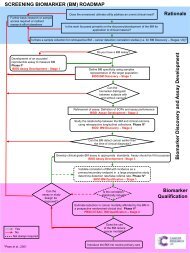

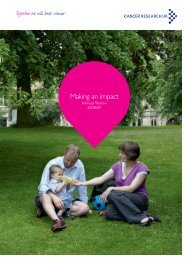
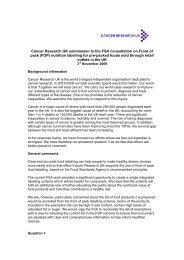
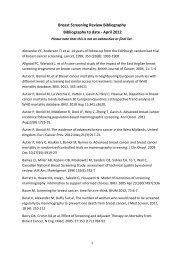




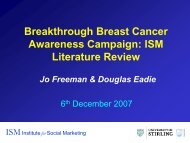
![[PDF] Cancer Research UK's strategy 2009 - 2014](https://img.yumpu.com/29239422/1/184x260/pdf-cancer-research-uks-strategy-2009-2014.jpg?quality=85)

